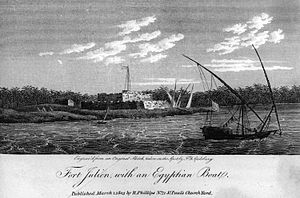Siege of Fort Julien
| Siege of Fort Julien | |||||||
|---|---|---|---|---|---|---|---|
| Part of the French Revolutionary Wars | |||||||
 Fort Julien, with an Egyptian Boat, 1803 |
|||||||
|
|||||||
| Belligerents | |||||||
|
|
|
||||||
| Commanders and leaders | |||||||
|
|
|
||||||
| Strength | |||||||
| 306 | 2,000 | ||||||
| Casualties and losses | |||||||
| 41 killed or wounded 264 surrendered |
10 casualties | ||||||
The Siege of Fort Julien was a military engagement that took place during the French Revolutionary Wars as part of the French campaign in Egypt and Syria from 8 to 19 April 1801. The action was between a British and Ottoman force numbering 2,000 men and a besieged French force of 300 men.
On 19 July 1799, only a few days before the Battle of Abukir, the French took possession of a dilapidated 15th century fortification built by the Mamluk Sultan Qait Bey, and embarked on a hasty rebuilding. The fort, located on the left bank of the Nile near Rosetta (Rashid), was renamed Fort Julien after Thomas Prosper Jullien, one of Napoleon's aides-de-camp. It was during this reconstruction that the Rosetta Stone was found. Fort Julien was an important link in the French defensive line on the route to Cairo and barred access from the sea to the lower reaches of the river. French gunboats operated along the river nearby, blocking access to the mouth of the Nile.
When the British landed at Abukir Bay on 1 March 1801, Baron Charles De Hompesh was sent by General John Hely-Hutchinson to capture Rosetta. Fort Julien was garrisoned by a total of around 300 men, comprising a unit of veterans or invalides supported by artillery and infantry from the 61st demi-brigade.
The British marched on Rosetta on 8 April, accompanied by an 1,000 Ottoman troops, and pushed on to besiege the fort with the 2nd (The Queen's Royal) Regiment of Foot under Lord Dalhousie.
...
Wikipedia
